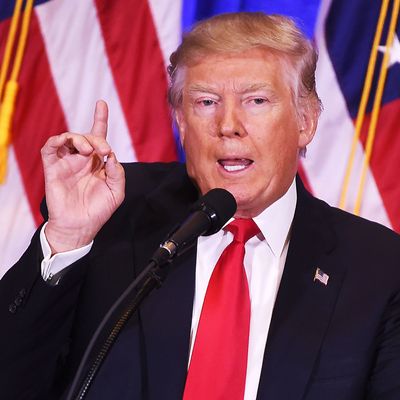
Donald Trump’s first press conference since the summer was a surreal exercise in the assertion of immunity from accountability. He either ignored questions about his behavior, or dismissed the questions as illegitimate. He painted a chilling depiction of politics not as an ongoing process but as a one-time event, settled in his favor by the presidential campaign, once and for all.
The press conference began with Press Secretary Sean Spicer attacking BuzzFeed as a “left-wing blog” (which it is not) for its questionable decision to publish an unverified dossier collected on Trump’s dealings with Russia on behalf of rival Republicans from the primary. This set the template for Trump to dismiss not only BuzzFeed’s report, but also a much more detailed and credible report by CNN (which had, but did not publish, the dossier thrown online by BuzzFeed). As the press conference went on, Trump would extend the dismissal of BuzzFeed to all skeptical news coverage.
Trump was asked about reports that intelligence agencies had concluded Russia hacked his opponents for the specific purpose of helping him win. He did not answer the question. Instead he expressed his view that having good relations with Russia would be nice, and concluded by mocking his Democratic opponent: “Do you honestly believe that Hillary would be tougher on Putin than me? Does anybody in this room really believe that? Give me a break.”
It is abnormal, to say the least, for a president-elect to defend his behavior by pivoting to a contrast with the candidate he defeated. But invoking Clinton served a purpose that became clear as the press conference drew on. It defined any question he disapproved of as a challenge to his legitimacy, and thus a campaign matter, and thus by definition moot. Asked about Senator Lindsey Graham’s proposal to introduce tougher sanctions on Russia, Trump harkened back to the campaign as well. “Lindsey Graham — I’ve been competing with him for a long time,” he said, “He is going to crack that 1 percent barrier one day. I didn’t realize Lindsey Graham is still at it.” Graham, of course, is not “still at it.” He is governing, not running against Trump. But to Trump, any action that might challenge him is indistinguishable from a contest for power.
Perhaps most telling of all, Trump insisted that the election validated for all time his refusal to disclose his tax returns, the only way to substantiate his claims not to have any business with Russia: “The only one that cares about my tax returns are the reporters. They’re the only ones. But no, I don’t think so. I won — I mean, I became president — no, I don’t think they care at all. I don’t think they care at all.” Likewise, the people don’t care about his precedent-smashing plans to maintain ownership of his business in an un-blind trust. Selling off the Trump business, his lawyer came on to explain, would expose the president to “unreasonable losses.”
Perhaps the most chilling thing about the affair was the abuse Trump and his staffers hurled upon the press corps. Trump brought in supporters to cheer his answers and shout at reporters who asked tough questions. He lambasted CNN as “fake news,” a term originally applied to deliberately false stories concocted by trolls, but quickly repurposed by conservatives for use against any news article that they disapprove of for any reason. Trump’s press secretary threatened to eject CNN reporter Jim Acosta if he continued to demand the chance to ask a question, which Trump refused to grant.
It is impossible to know what course American democracy will take under Trump’s presidency. The fears of authoritarianism may prove overblown, and Trump may govern like a normal Republican. But the initial signs are quite concerning. Trump believes he can demolish normal standards of behavior, like the expectation of disclosing tax returns, and placing assets in a blind trust. He has received the full cooperation of his party, which controls Congress and has blocked any investigation or other mechanism for exerting pressure. His dismissal of the news media might simply be a slightly amped-up version of the conservative tradition of media abuse, but it seems to augur something worse. Rather than making snide cracks about liberal bias, Trump escalated into abuse and total delegitimization. Will the abuse of the media be seen as an idiosyncratic episode, or the beginning of something worse to come? We don’t know. His early behavior is consistent with (though far from proof of) the thesis that he is an emerging autocrat. The people have granted him license to steal and hide as he wishes. The bully has his pulpit.






























